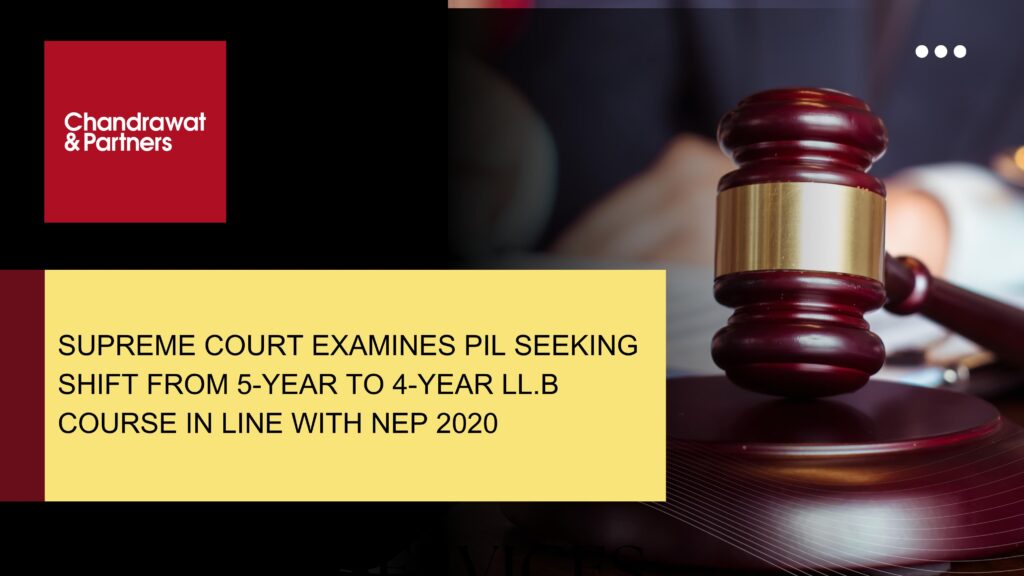Home > Recent Judgements > Supreme Court Examines PIL Seeking Shift from 5-Year to 4-Year LL.B Course in Line with NEP 2020
May 10, 2025
Supreme Court Examines PIL Seeking Shift from 5-Year to 4-Year LL.B Course in Line with NEP 2020
Introduction
On May 9, 2025, the Supreme Court of India heard a Public Interest Litigation (PIL) challenging the current 5-year integrated Bachelor of Laws (LL.B) program. The petition urges the judiciary to direct the Central Government and Bar Council of India (BCI) to restructure the course into a 4-year program, arguing that such a change aligns with the National Education Policy (NEP) 2020, which promotes four-year professional undergraduate degrees. This development has reignited a critical debate on the relevance, accessibility, and adaptability of India’s legal education framework.
Background: Current Legal Education Framework in India
At present, India offers two primary pathways to legal education:
- 3-Year LL.B Program: Open to graduates from any discipline.
- 5-Year Integrated LL.B Program: Aimed at students directly after Class XII, combining an undergraduate degree (B.A., BBA, or B.Com) with law.
The 5-year integrated course is often preferred due to its comprehensive curriculum, which includes foundational subjects in humanities and social sciences alongside core legal studies.
What the PIL Contends
The PIL, filed by Senior Advocate Ashwini Kumar Upadhyay, raises several critical issues:
- Policy Inconsistency: The petitioner argues that the 5-year integrated LL.B structure contradicts the NEP 2020’s direction, which envisions four-year undergraduate professional degrees. Thus, a shorter program would align legal education with national policy trends.
- Economic Accessibility: A longer course duration translates to higher tuition fees, living costs, and opportunity costs—particularly affecting students from economically weaker backgrounds.
- Content Redundancy: The inclusion of subjects like sociology, history, and economics, while enriching, may not be essential for core legal practice and could be trimmed or offered as electives in a 4-year program.
- Professional Parity: The petitioner highlights that most professional courses, including engineering (BTech), architecture (BArch), and certain management programs, are completed in four years, arguing that legal education should follow suit.
The NEP 2020 Perspective
The National Education Policy 2020 aims to revolutionize higher education in India by:
- Promoting flexible, multidisciplinary undergraduate programs of three or four years.
- Allowing multiple entry and exit points with appropriate certification.
- Encouraging professional degrees within a four-year structure to enable early career entry or postgraduate study.
The petitioner contends that continuing with a 5-year program for law fails to embrace these reforms and may deter students from entering the legal profession.
Supreme Court’s Observations
A bench led by Chief Justice D.Y. Chandrachud and Justice J.B. Pardiwala did not issue a directive but made several key observations:
- “Maturity” in Law: The bench emphasized that legal practice requires mature, well-prepared individuals. The longer duration of study supports the development of analytical thinking, ethical grounding, and contextual understanding—essential traits for future lawyers and judges.
- Status Quo Validation: The court noted that the current system is functioning effectively and does not urgently require reform from the judiciary’s end.
- Jurisdiction and Authority: The bench advised that curriculum reform falls within the domain of the Bar Council of India (BCI) and Ministry of Education, suggesting the petitioner address the matter through these regulatory channels.
Legal and Academic Reactions
From Legal Experts
Many legal academics have expressed reservations about compressing the course:
- A shorter course may undermine academic depth, especially in constitutional, procedural, and international law.
- Reduced exposure to humanities subjects may weaken contextual legal understanding, critical for roles in policy, human rights, and governance.
From Law Students and Advocates
On the other hand, some students and junior advocates support the reform, citing:
- Cost-effectiveness and faster entry into the legal job market.
- Improved access for students from rural or under-resourced backgrounds.
- Potential for greater mobility and interdisciplinary careers.
Structural and Implementation Challenges
Even if the course is revised, several challenges must be addressed:
- Curriculum Restructuring: Core legal competencies must be retained within a shorter academic timeline.
- Regulatory Realignment: The BCI and universities would need to revise accreditation norms, credit frameworks, and examination systems.
- Institutional Readiness: Law schools may need to update faculty models, teaching methodologies, and infrastructure to support more intensive delivery.
Global Context: How Legal Education Compares Internationally
- United States: Law is a postgraduate degree (Juris Doctor), usually completed in 3 years after undergraduate study.
- United Kingdom: Offers a 3-year undergraduate LLB, often followed by the LPC (Legal Practice Course) or BPTC (Bar Professional Training Course).
- Australia and Canada: Similar hybrid systems where law may be pursued either as an undergraduate or postgraduate path.
India’s 5-year integrated model is unique and often praised for producing law graduates with broad interdisciplinary grounding.
Conclusion
The Supreme Court’s consideration of the PIL challenging the 5-year LL.B course in favor of a 4-year program has brought renewed attention to the structure of legal education in India. While the court has left the matter to regulatory authorities, the petition has prompted valuable discourse around policy alignment, academic efficiency, cost accessibility, and professional readiness.
Any transition would require broad-based consultation involving legal educators, institutions, regulatory bodies, and students to ensure that any reform enhances—rather than diminishes—the quality and credibility of India’s legal education system.
Key Takeaways:
- The Supreme Court has not ordered any change but has acknowledged the debate.
- The NEP 2020 supports the idea of 4-year professional degrees.
- The BCI and Ministry of Education are the authorities responsible for initiating such reforms.
- A change to a 4-year LLB would require significant curriculum and institutional overhaul.
- The debate reflects broader questions about access, affordability, and the future of legal education in India.
For more information or queries, please email us at
[email protected]





